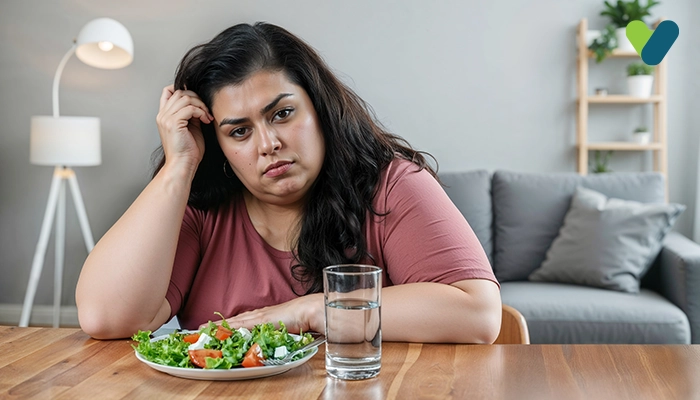People have been going crazy over how much weight they gain or lose when taking a particular medication. You should not expect to gain any significant weight due to the Covid-19. However, there are exceptions to every rule, and people will still find themselves gaining an extra 5 lbs after suffering from Covid-19.
The article will explain the fluctuation in body weight during Covid-19 treatment or post that and why it may cause some people to experience a slight increase in their body weight and other side effects such as nausea and vomiting. It also discusses what these changes can mean for someone's overall health during treatment with this medication.
Reasons for Weight Gain During COVID-19 Treatment?
Weight gain is typical during Covid-19 treatment because most of the medication comprises Polyethylene Glycol (PEG). PEGs are used in many products such as laxatives, toothpaste, and even food. The most common side effect associated with taking the medication is nausea from the stomach's contents. Usually, when your body senses food entering the esophagus, it sends a signal to your brain that tells you that you are full and stop eating.Because COVID-19 medication is in powder form, it bypasses this process which can cause nausea and vomiting. If the patient feels that their stomach is full or nauseous during the treatment, they should contact their physician immediately. COVID-19 has a long-acting injectable medication, and it does take time for your body to get used to the PEG.
Now that we know why COVID-19 may cause weight gain, let's talk about how patients did not experience weight gain from COVID-19. The infected patients should make sure to follow a healthy, nutritious, and light COVID-19-related diet.
Treatment with COVID-19 is long-term, and patients are encouraged not to gain weight during the treatment. Coronavirus patients are given medication in weekly doses; this provides the patient with enough time between doses to get their energy levels at their best, for their appetite to return, and for them to return to their regular, non-COVID-19 restricted diet.
COVID-19 Side Effects From Weight Gain
Weight gain while undergoing Covid-19 treatment is average. However, some dangerous side effects are associated with weight gains, such as high blood pressure and Diabetes. Blood pressure and diabetes increase in patients who take covid-19 because they experience more significant physical stress from the added disadvantage of Covid-19. However, with proper diet and physical exercise, it is possible to reduce the effects of Covid-19 weight gain. If you want to learn more about Covid-19, contact your physician or pharmacist.Tips to Minimize Weight Gain During COVID-19 Treatment?
The COVID-19 infected patient can minimize weight gain by recording their body weight before and after COVID-19 treatment. Patients must also be in touch with their physician if they notice a weight gain of more than 5 lbs or if their doctor has told them that they expect the treatment to cause weight gain. The infected patients may also consider COVID-19 injections in pills or inhalers to avoid weight gain entirely. The medications and inhalers provide the same active ingredients as covid-19. Pills and inhalers are not as effective as injections but do not cause weight gain.Tips for Maintaining a Healthy Diet & Exercise During COVID-19 Therapy
COVID-19 patients may be tempted to give in to their temptations when they crave a particular food or if it is easy to eat. The patients should remember that healthy eating and exercise will help them feel better during and after covid-19 treatment. It has been found that the odds of obesity are two times greater in Covid-19 infected patients who have an unhealthy diet and no set exercise routine.Tips to Deal With Weight Changes After COVID-19 Treatment
COVID-19 weight gain can last for one week after Covid-19 treatment has stopped. COVID-19 will not be metabolized out of the body very quickly, so it takes time for Covid-related weight gain to go away. Covid patients may choose to exercise, eat healthily, or even take injections to help deal with Covid-related weight gain.Weight gain should not be a problem for Covid-19 patients because covid weight gain is proportional to covid dose. COVID-19 dose, in addition to the covid route of administration, covid clearance pathway, and covid genetic factors, Covid-19 weight gain is proportional covid dose. Covid patient obesity seems to be from systemic exposure—covid-19 bioavailability of covid doses from the route of administration. Patients who take high doses of COVID-19 or have a compromised liver function are more prone to Covid-related weight gain.
Do COVID-19 Injections Cause COVID Weight Gain?
Typically COVID-19 infected patients will experience weight gain after taking the medication for about one week. Covid-19 injections do not cause weight gain because it is easier for the body to process liquids than solids. The injections are typically preferred by patients who do not like the idea of taking pills.Since Diabetes is an underlying condition that is deadly and a severe issue for the body, contracting Covid-19 increases the risk several folds. People can follow proper tips and routines to save themselves from getting extra weight and reduce weight if they have gained while tackling Covid-19. There is a strong prescription medication used to treat covid-19. The weight gain experienced when taking covid-19 can be managed in many ways not to cause anxiety or other health problems in the patient. Patients need to contact their doctor before changing their diet or exercise habits. Consulting the doctor is very important because we don't know the underlying issues and consequences. Without taking any chances, we should take reasonable care to protect ourselves.


